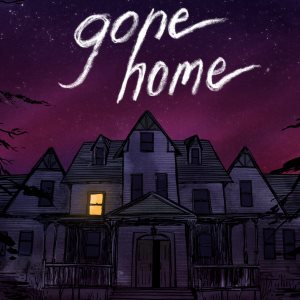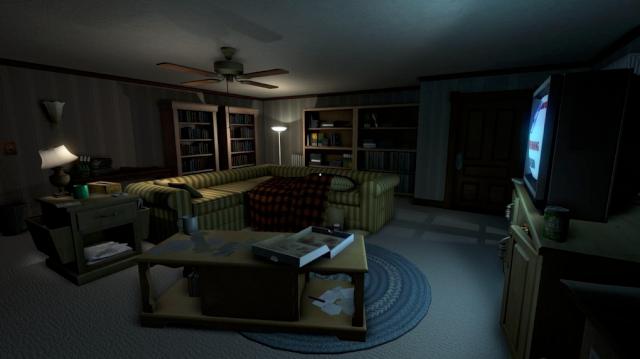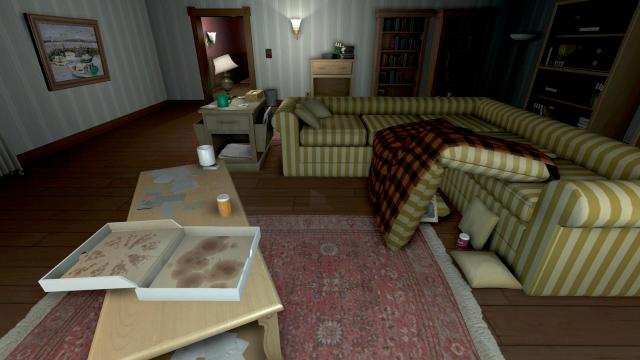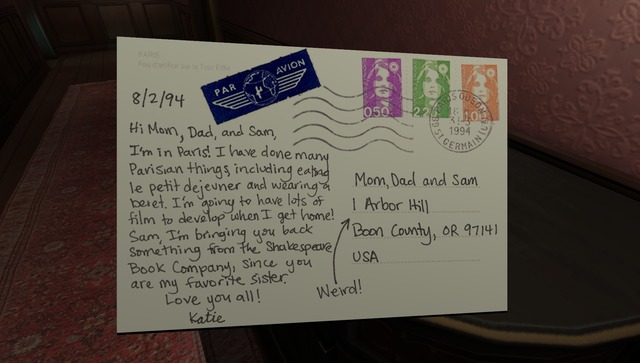
I’ve just finished a game that took me less than three hours, had no other characters to interact with and gave me pretty much nothing by way of a story to get started with. So why exactly did the ending give me goosebumps and make me feel like I’ve just completed one of the most remarkable gaming experiences for quite some time?
The answer lies in several places. For one, the lack of back story sounds like a hindrance, but is exactly what Gone Home is all about – having travelled round Europe for a while your character (a girl named Katie in her early 20s) comes back to the new family home to find a note from her younger sister telling her she’s not home, and not to try to find her. While rain pours down in the dark and thunder rolls menacingly, you enter the house to find it totally empty and no sign of your sister or parents. From this point forwards you’re exploring, discovering and piecing together a picture of where everyone has gone.

It’s difficult to explain just how atmospheric everything is, through both the silence within the house and the total uncertainty of what you’re dealing with. While the weather maintains its assault on the outside world you’ll be looking for light switches or lamps to help you see where you are while floorboards occasionally creak underfoot. The house itself is utterly silent, with only the occasional respite of a record player or the occasional cassette tape to break the quiet if you decide to hit play when the opportunity arises.
While your parents’ whereabouts can be figured out by reading the letters, notes and leaflets left on tables, in drawers or pinned on notice boards it’s the story of Sam, the younger sister, that takes centre stage. As you look at specific items through the house snippets of her journal are read out, leading you through a beautifully written story of teenage life, the quality of which is matched perfectly by the voice acting associated with the two girls. Following this story through to its conclusion is effectively the whole purpose of the game, and its final moment will also trigger the credits whether or not you’ve figured out where your parents have ended up.

Creeping round an empty house that you don’t know (a feeling deliberately echoed by Katie having never seen the house before) has two feelings attached to it, and while there’s an element of fear about opening another door to another dark room, there’s a huge intrigue factor that makes you want to explore further. The initial note from Sam not wanting you to look for her also stays in the back of your mind throughout, and returns strongly to mind in the closing stages as the reality of the situation starts to sink in. The house and its contents are modelled brilliantly for the mid-90s settings, adding to the intrigue by sparking questions in your mind that only heighten the mystery of the empty house. Being able to interact with pretty much everything helps as well, and it becomes second nature to grab and examine every pencil, tissue box and magazine you can find just in case you’re about to discover something central to your searching.
But back to the opening paragraph… I finished this in about two and a half hours, and that was despite my insistence on reading everything, picking everything up to examine it and checking under every bed, in every corner and on every shelf for extra little bits of information. So is Gone Home too short? Definitely not. There’s only so much wandering round an empty house you can do before you get bored, and Gone Home gets it spot on in terms of keeping you interested. The price might be a sticking point for some – at £15 it doesn’t appear to pack the same value that other games might – but like an expertly made movie it’s unlikely you’ll feel cheated when you get to the end and realise just how much emotion and compassion is running through you. It’s the kind of reaction you’ll rarely get from a game, and while there are other games that give you similar emotional tingles (To the Moon springs to mind) it’s unusual enough to make Gone Home feel like something really pretty special.

Essentially there’s only one way to understand how this game makes you feel: fire up your PC, buy it and play it. Then, and only then, you’ll see what the fuss is about. It’s a stroke of genius.
Reviewed on PC


Bought this based on the review & agree totally, such a fantastic game.